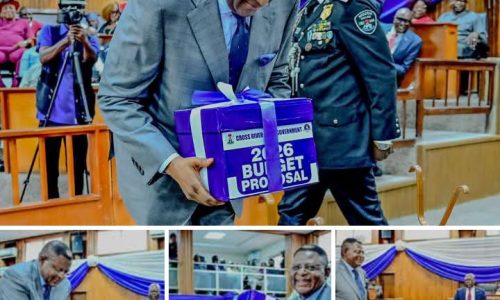C’RIVER BOOSTS AGRIC MECHANISATION, RETOOLS FARMING CALENDAR AS TRACTOR BENEFICIARIES CONCLUDE THREE-DAY TRAINING
✓ Commissioner Ebokpo announces full mechanisation rollout across senatorial districts as operators complete training under ministry’s partnership with Bespoke Design Concept Ltd.
By Amawu, Cletus Albert Amawu.
CALABAR – In a renewed effort to transform Cross River’s agricultural landscape and reintroduce predictability into its farming calendar, the state government, through the Ministry of Agriculture and Irrigation Development, has concluded a three-day training programme for tractor operators and farmer beneficiaries across the three senatorial districts.
Speaking at the close of the exercise at a demonstration farm in Atiabo, Calabar, the Honourable Commissioner for Agriculture and Irrigation Development, Hon. Johnson Ebokpo, KSM, emphasised that the initiative marks a critical phase in the state’s push for full-scale mechanisation ahead of the next farming season.
According to him, the training, which brought together beneficiaries from the Northern, Central, and Southern senatorial districts, was designed to ensure operators are technically prepared to deploy tractors efficiently across various farm clusters.
“After this training, the beneficiaries are expected to complete their documentation, pick up their tractors, and begin deployment in readiness for the next planting season,” Ebokpo said. “Even within the dry season, we expect some level of deployment to support irrigation and land preparation activities across different farm locations.”
He noted that the initiative goes beyond a one-off intervention, explaining that it forms part of a broader mechanisation programme embedded within the service-level agreements between the Ministry and its technical partners.
“We are retooling our farming calendar to introduce predictability,” the Commissioner added. “Lack of mechanisation has been a major reason for delays and inefficiencies. With this programme, we now have the capacity to plough, prepare, and plant on schedule. Mechanisation also ensures better agricultural practices, which will naturally translate into higher yields and more food on our tables.”
Ebokpo further revealed that continuous capacity-building sessions will follow this initial training phase, with sustained engagements between tractor manufacturers, operators, and local vendors to ensure spare parts availability and technical support.
“This is not a one-off project but a long-term programme. The manufacturers have committed to setting up an assembly and maintenance facility here in Cross River State,” he stated.
On his part, Mr Ikpeme Ikpeme, representative of Bespoke Design Concept Limited, manufacturers of the tractors, described the exercise as both practical and impactful.
He noted that while participants showed enthusiasm, one challenge identified during the training was the limited familiarity of younger operators with manual transmission systems.
“Most people these days are used to automatic transmission vehicles,” Ikpeme explained. “The tractors operate on manual gear systems, so we first had to teach basic manual driving skills before moving to actual tractor operations.
However, we’ve provided a helpline that connects operators directly to the manufacturer for ongoing technical assistance.”
The training, conducted in partnership with Bespoke Design Concept Limited, aims to empower cooperative groups and individual beneficiaries with the knowledge and equipment needed to drive agricultural productivity and self-sufficiency in Cross River State.
Mr. Aya Ebirigor, Secretary of De-Creed Multi-Purpose Cooperative Society (MPCS) Limited, commended the initiative as a “timely intervention” that aligns with the state’s vision for food security and mechanised agriculture.
He disclosed that his cooperative participated actively in the training by nominating an experienced operator, noting that “it’s a big deal and a great pleasure to be part of this subsidised loan scheme.”
“Our operator is already good with machines; this training just helped him familiarise himself with this model,” he said. “Maintenance could be a challenge initially, but we believe that with available engineers and support, we’ll overcome it. Mechanisation will surely boost productivity, improve revenue generation, and help the state achieve food sufficiency.”
He appealed to the government to sustain and expand the programme so that other farmers can benefit in subsequent phases.
“We thank the government for this privilege and pray that it continues, reaching more cooperatives and farmers who need such opportunities.”
Hon. Asa Felix Effiom, Councilor Ward 3, Calabar South, who doubles as both a beneficiary and trained operator, expressed gratitude to Governor Sen. Bassey Otu and Commissioner Johnson Ebokpo for “coming through for farmers at a crucial time.”
“It wasn’t easy for us before now,” she said. “We used hoes and machetes for everything, from tilling to harvesting, but with these tractors, farming will now be faster, easier, and more productive. In Calabar South, we’ve never had such an opportunity before.”
She added that the intervention will greatly enhance agricultural output and rural livelihoods.
“This is a blessing to farmers. I’m proud to be part of this initiative and thankful to the Governor for making me one of the beneficiaries.”
Mr. Daniel Bassey Ekpo, an experienced operator from Akpabuyo, shared insights on the technical aspects of the newly introduced tractors, noting that though they differ from the larger international models he previously used, they are efficient and well-suited to local terrain.
“I used to operate bigger tractors before, but this new one is manageable and works effectively for ploughing,” he said. “As farmers, having access to machinery makes work much easier and less stressful.”
He appreciated the Governor and the Ministry for providing the machines but appealed for more advanced models in the future.
“We thank the Governor and Commissioner for what they’ve done so far. This machine has made our work easier, but we look forward to even more advanced ones that will further improve efficiency.”
With the successful conclusion of this first training phase, Cross River State’s agriculture sector appears poised for a mechanisation revolution, one capable of redefining rural livelihoods, ensuring food security, and positioning the state as a regional model for sustainable agricultural development.



